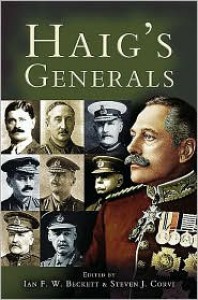Offers sympathetic reevaluations of the “butchers and bunglers”

For decades the generals who commanded the armies of the British Expeditionary Force in the First World War have been subjected to considerable criticism in both the popular and scholarly media. Long derided as “butchers and bunglers”, they were typically viewed as unimaginative fools who callously presided over the slaughter of a generation. In recent years, however, these much maligned figures have enjoyed something of a rehabilitation, as a number of historians have argued that the British military leadership was far more innovative in their application of new tactics and technologies to break the stalemate on the Western Front than they have been often credited, and that the army was just beginning to profit from the benefits of this when the war came to an end.
Ian Beckett and Steven Corvi’s book can be categorized as part of this rehabilitative effort. A collection of short biographies written by different historians, it offers a reexamination of the nine generals who commanded armies during Haig’s tenure as the commander of the BEF. As a collaborative work it bears the idiosyncracies typical of a project, but all of the chapters share a sympathetic attitude towards their subject, with each focusing on a particular action that serves as a case study for their interpretation. For the most part the treatment manages to be both sympathetic yet even-handed, as only occasionally (as in the case of John Lee’s chapter on William Birdwood) do they come across as excessively partisan.
Yet despite his presence on nearly every page, one person seems curiously absent – Haig himself. While the focus is properly on the generals under his command, the analysis of their roles and performance invariably touches on their relationship with Haig. Given the reevaluation being undertaken by the authors, the work might have been stronger had there been a separate entry on Haig, or at least a chapter assessing his overall role within the BEF. Without it, the chapters are nine useful threads that need to be tied together in order to properly support the case that the overall assessment of these men has been unfair. It is the major limitation in what is otherwise a useful reassessment of men who have at times been judged unfairly for their efforts to grapple with the changing demands of the new ways of warfare on the Western Front.
 2
2






